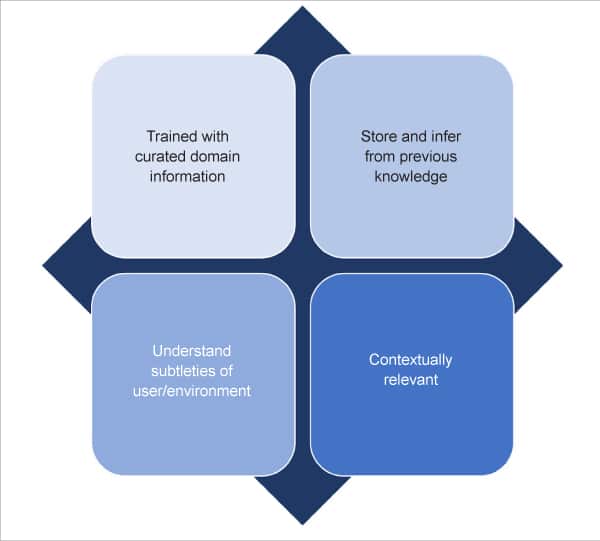Cognitive services are of great use in modern web applications. Take a look at their characteristics, benefits and challenges.
Some of the common traits of modern web applications are high scalability, high availability and great user experience. These applications need to be accessed from anywhere in the world with low latency and should be highly secured. They also should be rendered on multiple device types and provide an omni-channel experience. And the story doesn’t end there. They can be made more ‘engaging’ by leveraging cognitive (artificial intelligence/machine learning) services. The goal is that an application needs to understand the user just like a human being and provide great overall user experience. With cognitive services, the application can see, hear, speak, understand, interpret and decide!
Characteristics of cognitive systems
Cognitive systems use data from different systems, understand context and try to provide the best possible response. They use machine learning and artificial intelligence techniques to achieve this.
They iterate over a rich wealth of knowledge to provide the best possible answer. They also need ‘meaningful’ interactions with the user as the responses depend on the relative dimension of understandability of user context by the cognitive service.
Additionally, these systems and services are constantly in a state of change as the environment provides new data and information over time. They must also understand the situation and dynamically adapt.
Ways to modernise your web application
Some of the common patterns to modernise your application with cognitive services are:
Instead of using textual data as input, use scanning or optical character recognition techniques.
- Instead of written input, leverage speech technologies. The speech-to-text converter will convert into the required text and process.
- For authentication, instead of passwords, use fingerprints or retina scanning.
- For user identification, instead of using standard ID (government ID, driving licence, etc), use facial recognition.
- For registration, instead of using textual input, a document (PDF, Word, etc) can be uploaded and the application can intelligently read the content and auto-fill the details.
- Social media companies use a number of ML/AI algorithms. Integrate them into your web application.

Key benefits of cognitive services
There are a number of benefits of using cognitive services including:
- Intelligent user identification for security, surveillance systems
- Intelligent content moderation by showing only appropriate content in web pages/social media sites
- Cater to diverse audiences by embedding multi-lingual support in the application
- Speaker recognition in web applications for authentication
- Auto suggestions and intelligent understanding of the user and environment to provide relevant and curated information
- Personalisation in conversational apps by intelligently navigating the user interactions and guiding towards the intent (goal) of the interaction
Challenges of cognitive services
With every great technology comes a bunch of challenges as well. Some of the pitfalls of excessive and unregulated cognitive services include:
- Prevalence of fake news in media applications
- Wilful polarisation of readers in social media sites
- Security risks
- Increase in carbon footprint because of higher computational needs
- Longer development and deployment cycles
Python libraries for cognitive services
You can take advantage of Python libraries to seamlessly integrate cognitive services into your web application. These services are typically exposed using Restful APIs and programming SDKs. Examples include:
- OpenCV for computer vision
- SpeechRecogntion and PyAudio for speech to text
- TTS library for text to speech
With cognitive services, the capabilities of web applications are endless. These intelligent algorithms can use natural methods of interaction and make the customer experience better. However, with great power comes great responsibility. It is the responsibility of the provider and creator to use these cognitive capabilities in an ethical way.












































































